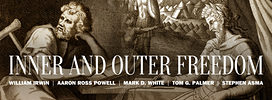Lead Essay
William Irwin’s political libertarianism began with his appreciation for inner freedom. Existentialism, Stoicism, and Buddhism have all taught the importance of living a free inner life: Even utopia would be unbearable to someone who is ruled by their desires; to someone who has attained self-mastery, even dystopia could be relatively bearable. Irwin recommends mastery over the impulses as a key part of living a free life, in the broadest sense of that word.
Response Essays
Aaron Ross Powell argues that inner freedom is best pursued in a free society, and that these two aspects of the good life are mutually reinforcing. A regard for virtue in either one should lead reflective individuals to give some attention to the other as well. Although many forms of political action seem clearly to be bad for the soul, this need not be the case for all of them.
Mark D. White looks to Immanuel Kant’s account of freedom as a way of bridging the gap between inner and outer freedoms. Although our minds may be the only things we can control, there remain many things we can influence indirectly, including other people and the affairs of our society. And to the extent that we can exert a good influence, we should certainly do so.
Stephen Asma says we should maybe just give up on inner freedom. An authentic human life would certainly make room for parents, children, siblings, and even spouses, and for the attachments that loving them will entail. So while mastering the appetites is good, so too is family life. It is not always good for mankind to be alone, and family life is the origin of one’s ties to society.
Tom G. Palmer argues that inner freedom is a valuable thing, but that it is most reliably obtained when one is not politically oppressed. Precisely defining both inner and outer freedom becomes paramount, because there is a risk of defining either so broadly that it destroys its counterpart. Palmer closes with a defense of the engaged political life, one that understands liberty to be a helpful reinforcement in many different, though related, approaches to self-mastery.
Coming Up
Conversation through the end of the month.
Related at Cato
Cato Unbound: ”Liberty: Positive and Negative,” March 2010
Cato Unbound: ”Immanuel Kant and Classical Liberalism,” October 2016

